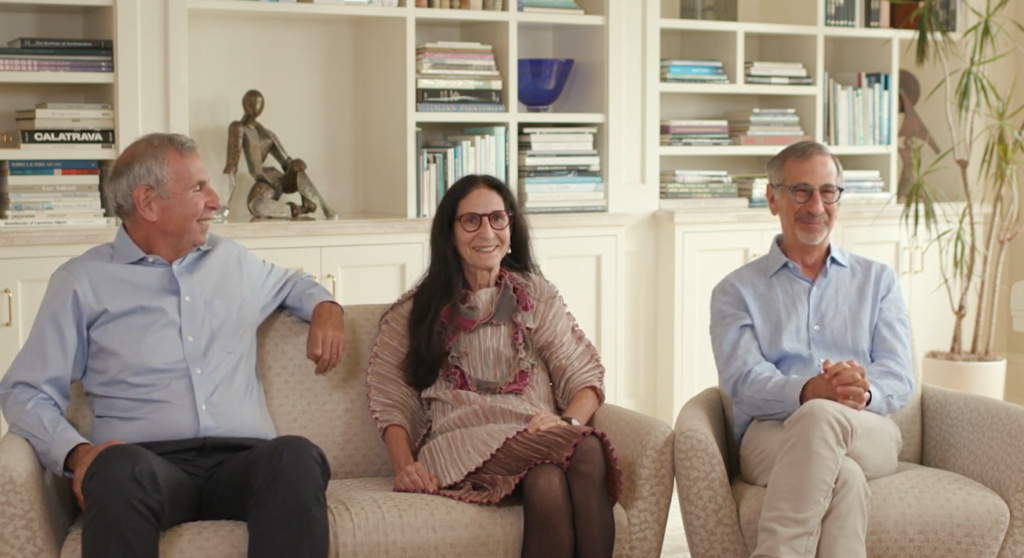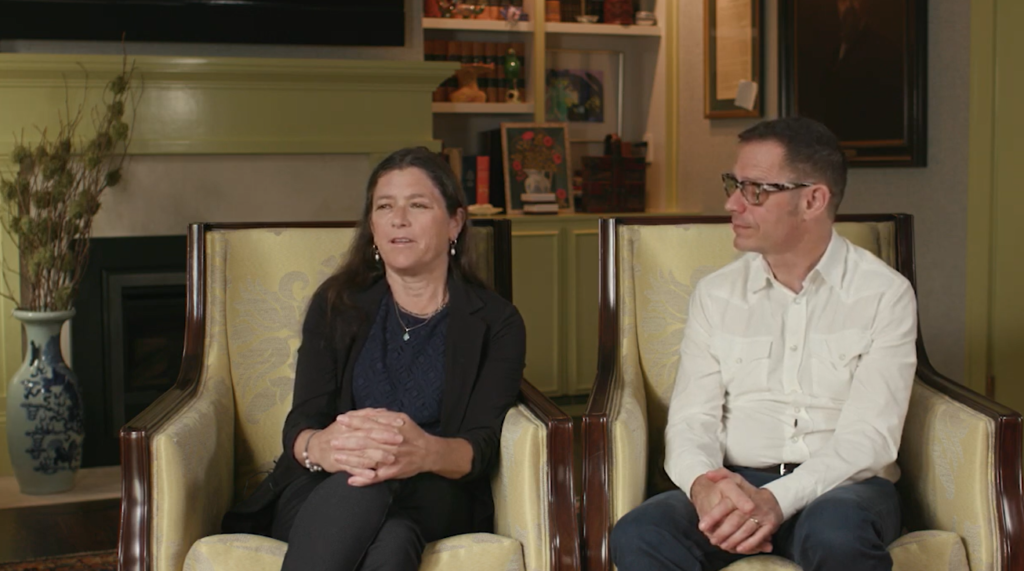
The Koshland-Friedman Family
Making the Bay Area more equitable is not a spectator sport. It requires everyone’s active involvement, including the region’s most privileged residents. As Ellie Friedman, granddaughter of SFF co-founder Daniel E. Koshland Sr., told us in 2021: “We were given this gift to empower others. How can we do that better?”
Ellie and her brothers, Bob and David, have long been SFF donors and leaders in the philanthropic world, but they also acknowledge the intrinsic irony of their roles. The wealth they have inherited is partly the result of the very systemic inequalities they are trying to dismantle through their involvement in philanthropy. Their grandfather was well aware of this irony, too. “He knew he was privileged, and he lived that by interacting with others and being extremely generous,” Bob reflects. “He taught us to be aware of our good fortune and focus on other folks.”
Fun fact:
With the Greek word anthrōpos at its root, philanthropy literally means “love of mankind.”
Beyond giving freely and often, their grandfather often made privilege the subject of light-hearted mockery. One of his favorite sayings—that still brings a smile to his grandchildren’s faces—was: “Don’t be so modest, you’re not that important.”
Many members of their family share this trademark humility, including Koshland’s sister, Frances “Sissy” Koshland, who spoke memorably about money: “Don’t be too proud of it. Don’t be ashamed of it. Use it well.” This humility, which often motivated their grandfather to give anonymously, lives on in the hearts of all three siblings. A sense of community responsibility is a guiding belief not just in their own lives but in the lives of many of their family members who also have donor advised funds at SFF.
The Hellman Family: Learning the Nuts and Bolts of Saying ‘Yes’
This sense of responsibility and service to community is also familiar to Mick Hellman and Patricia Hellman Gibbs, the children of Warren Hellman, legendary SFF Board Chair from 1998 to 2002 and renowned private equity investor. Their father inspired a commitment to philanthropy by the way he lived his life. As Patricia recalls, “He was a tremendously generous man, just a heart that was open and wanting to see improvements in the community.”
Her brother Mick agrees: “He believed in the power of saying ‘yes.’”
For Patricia and Mick, the process of learning about philanthropy started in their 20s when their father gave them about $5,000 to allocate to nonprofits. “I remember that it wasn’t as easy as it seemed,” Patricia recalls. “It felt like a huge responsibility, and I just didn’t know how to fix the problems of the world.” Their father energetically engaged them in conversation about their ideas, what they’d done with the money and why. The excitement of these dialogues planted the seed for a lifetime engagement with giving.
For Patricia, SFF also played an instructive early role. She and her husband Dr. Richard Gibbs—both primary care physicians—ran a private practice together in San Francisco in the early ’90s. They couldn’t help but notice a dramatic shortage of doctors caring for the uninsured. As Patricia recalls, “We thought, ‘Wow, we’ve got all this equipment. We are completely set up. We could actually just start taking care of uninsured people who don’t have a lot of people clamoring to help take care of them.’”
While they had a clear sense of a need and an idea of how to meet it, Patricia remembers: “There was the nagging problem of, well, how do you do that? What’s the infrastructure? What type of organization do you have to have?” Turning to SFF, they connected with program executive Ruth Tebbets Brousseau, who was eager to share her health care expertise and walk Patricia and Richard through the necessary steps of building a board, becoming a nonprofit and applying for grants. SFF also offered early fiscal sponsorship to help make the San Francisco Free Clinic a reality.
Reflecting on the important role SFF played in setting up the clinic, along with seeding and incubating thousands of nonprofits over many decades, Patricia says the foundation is “not just about grants. It’s also about educating people. It gives you the knowledge to be a better philanthropist and … [is there] as an educational resource for people that want to start projects.” Thanks to Patricia and Richard’s combined initiative and our support, the San Francisco Free Clinic has since 1993 provided primary care and preventive services at no cost to thousands of people.
Philanthropy Is Personal
As Patricia Hellman Gibbs’ deep commitment to health care attests, each person brings special interests to their giving. What catalyzed her into action was distinct from what catalyzed other family members. This independence of mind, which made her father proud, is a key ingredient of meaningful giving. It is something she and her brother Mick also see in their own children, whose distinct approaches to philanthropy reflect their pressing concerns about the world.
“SFF has a willingness, and in fact a desire, to be multigenerational, to be able to work with families and next generations on their philanthropy and developing their own philanthropy,” says David Friedman.
The next generation of Friedmans have also found issues that inspire them to get involved and give. According to Bob Friedman, one of his daughters has been involved in “anti-slavery and human trafficking” work for more than 20 years.
“I think we shared [with our children] that activist involvement is not only about writing checks … but also being in the world and giving back with their talents and who they are,” Ellie Friedman says.
SFF embraces the personal nature of philanthropy. No matter what a person’s driving interests, we can help them partner with people and organizations pushing for positive change. “The systems are just well set up at SFF,” Mick Hellman says. “It’s a place to go to create a donor advised fund or otherwise get involved … and know that it’s going to be sound and actually have an impact in the Bay Area.”
“I think if there’s one thing I learned from my father,” he adds, “it’s that effort against a problem over time is how you get results and how you fix things.”
SFF’s anniversary marks 75 years of active engagement with community efforts to remedy societal problems. While the most urgent causes and issues may change, a commitment to SFF is a commitment to the health and well-being of the Bay Area. With the support of our donors, we will continue to make steady progress for generations to come.

